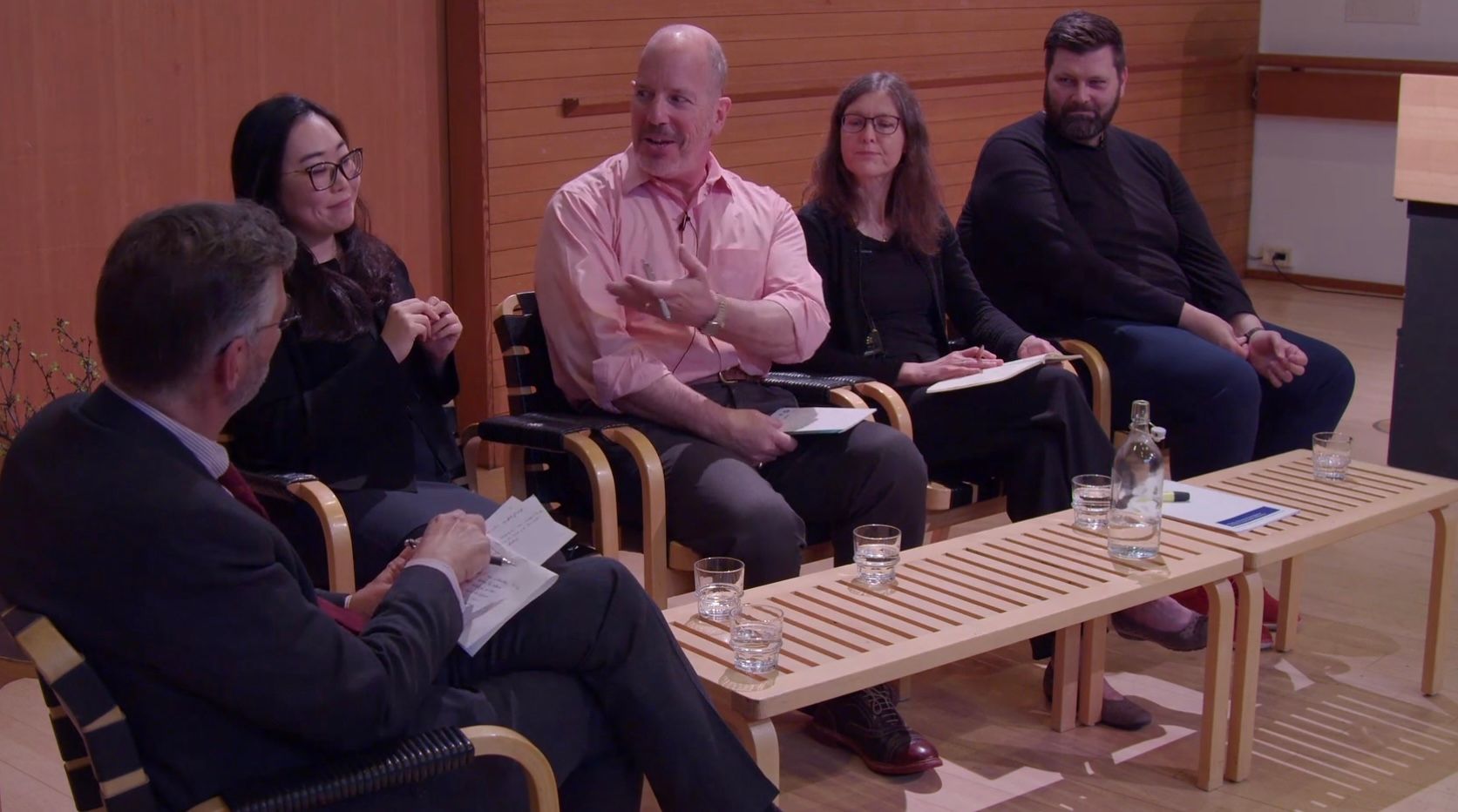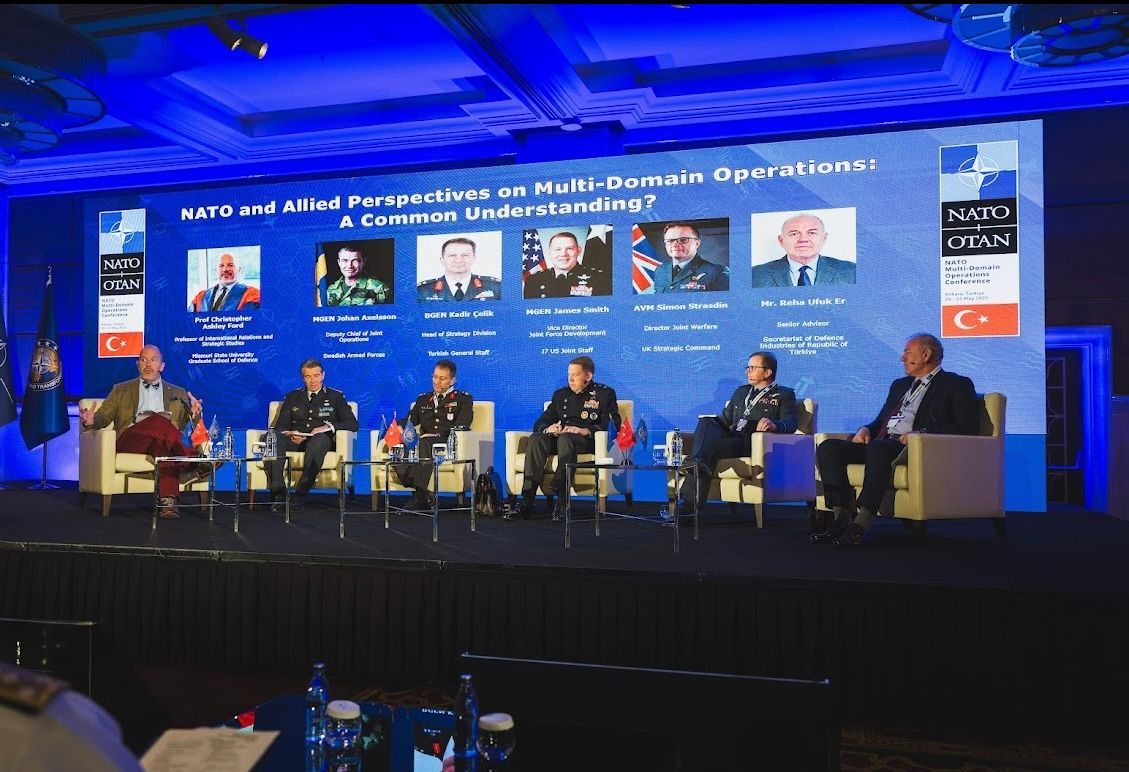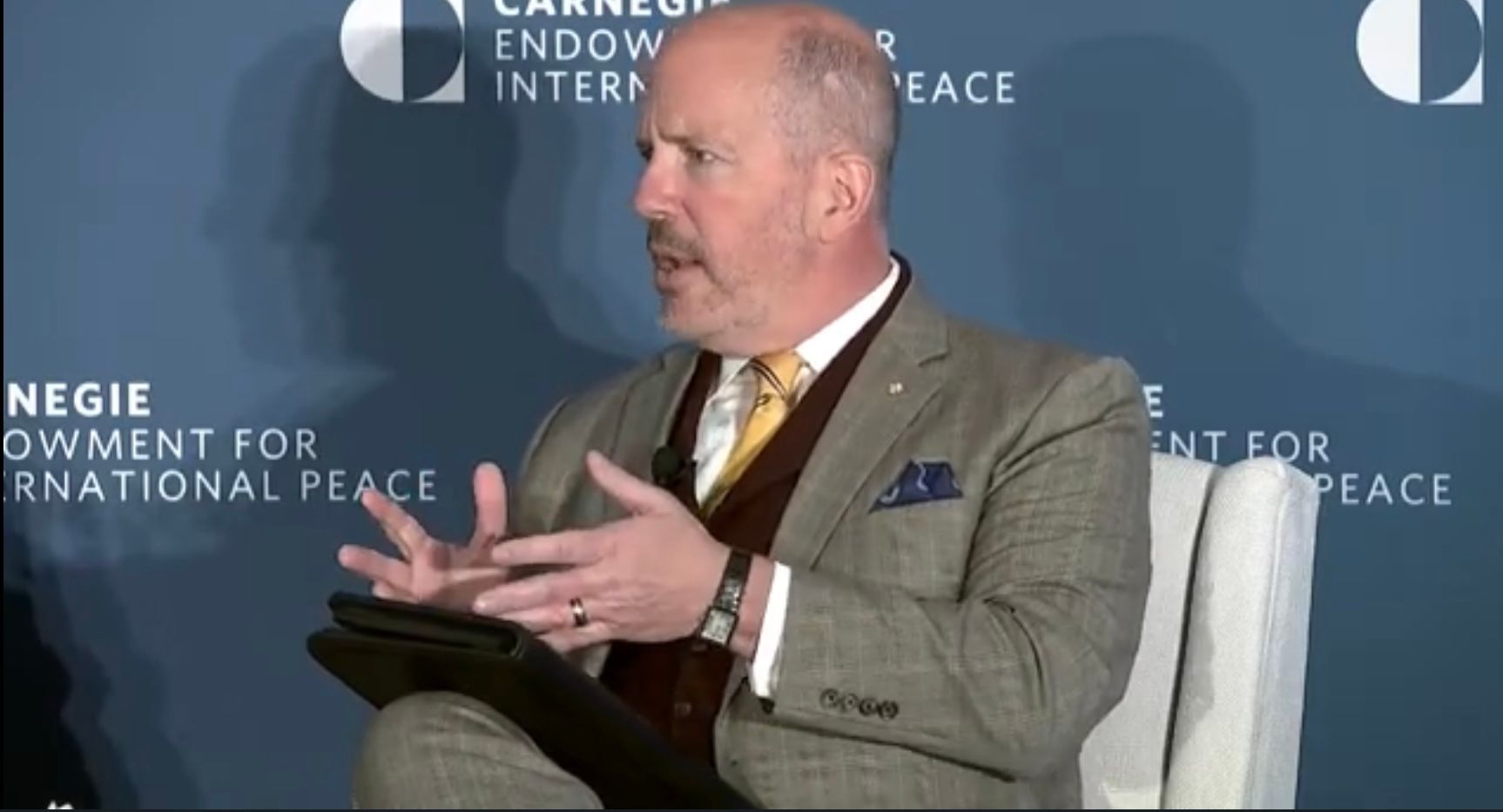The 2015 NPT Review Conference and the Nonproliferation Regime
Note:
This is an edited version of the text upon which Dr. Ford based the remarks he gave at a workshop on the 2015 Review Conference of the Treaty on the Non-Proliferation of Nuclear Weapons (NPT) held at the Woodrow Wilson International Center for Scholars (WWICS) on June 3, 2015. This meeting was sponsored by the Los Alamos National Laboratory (LANL).
Good afternoon, everyone. Let me begin by expressing my thanks to Joe Pilat and the Los Alamos lab for their kind invitation to participate in this discussion, and to the Wilson Center for being such a gracious host. It’s always a pleasure to be here. I should also note that, as usual, what I say today represents my own personal views, and should not necessarily be taken to represent those of anyone else in U.S. Government.
Those of you who have been around this business for a while may remember the odd combination of outrage and glee with which the NPT diplomatic community and the U.S. political Left greeted the failure of the 2005 RevCon to reach a consensus final document at a time when the United States was being represented there by the George W. Bush Administration. Well, those of us who bore so much criticism for our supposed “failure” then can probably be forgiven some Schadenfreude at the Obama Administration’s RevCon failure now.
I. Failure is an Option
But since Schadenfreude isn’t terribly constructive, let me soften the blow by repeating what I’ve said many times over the years: a failure to reach consensus on a RevCon final document simply isn’t a particularly big deal, and failing to reach consensus is in any event better than having “succeeded” in agreeing on a bad document.
Nor is it obvious, I should point out, what “success” at a RevCon accomplishes in the first place. It seems pretty clear at this point, after all, that even if you liked what was said in the final document of the purportedly “successful” RevCon in 2010, it doesn’t appear to have had any actual effect in changing anything in the real world for the better. Except insofar that agreeing to foolish things in a final document can create diplomatic headaches for years thereafter, neither RevCon “success” nor “failure,” it seems to me, correlates meaningfully with anything important in the real world.
Frankly, the dirty little secret of the NPT Review process is how discouragingly irrelevant it now is, and how divorced its diplomatic theatrics have become from the real challenges facing the nonproliferation regime and the stability of the international system. As someone who devoted some years of my life to the NPT process, it pains me to admit this, but it has become hard to deny.
II. The Shadow of Iran
The elephant in the room at the 2015 RevCon was the fact that the so-called P5+1 powers – the United States, Britain, Russia, China, France, and Germany – were on the cusp of agreeing to Iran’s insistence upon a capacity to enrich uranium. In fact, they were (and at the time of writing apparently still are) about to reward Iran and legitimize its years of International and Atomic Energy Agency (IAEA) safeguards and NPT violations, as well as its contempt for multiple, legally-binding Chapter VII United Nations Security Council resolutions, by lifting sanctions against Tehran as part of a deal that would allow Iran to keep doing what it has insisted all along it has a right to do. At the time of the RevCon, in other words, Iran was clearly on the edge of a signal victory in its slow-motion standoff with the nonproliferation regime.
This showed in New York. There was, for instance, a good deal of posturing from various delegations – and not just the Non-Aligned Movement (NAM), which was, rather shamefully, represented at the RevCon by Iran – about all countries’ supposed “right to enrich uranium.”
Inserting words into Article IV of the NPT that the Treaty’s drafters were thankfully never so foolish as to pen, the Iranian NAM spokesman took a stand in support of what he called the “ inalienable right to develop ... a full national nuclear fuel-cycle.” As a consequence of this right, Iran argued, unilaterally-enforced export controls on dual-use technology are actually a violation of the NPT.
There are not positions it shocked me to see Iranians articulate, of course, nor even for the NAM to parrot. It’s been clear for years that essentially nobody in the NAM loses any sleep over the spread of proliferation-facilitating technologies, or indeed about the future of the nonproliferation regime that this spread has steadily been imperiling. Nor was I particularly surprised, at this point, to see Russia’s ambassador endorse the idea of what he called a “ right to … the enrichment of uranium. ”
What was dispiriting, however, was to see such pronouncements win the day by default, because no one saw fit to challenge them, thus giving the false impression that these things are actually true. Even the Americans ended up passively endorsing the “right to enrich” thesis, while, of course, their diplomacy with Iran was moving rapidly to accept Iranian demands – ostentatiously grounded in an assertion of this “right” – to keep enriching.
How far the mighty have fallen. It was only back in January , after all, that a U.S. Senator asked Deputy Secretary of State Tony Blinken about this so-called “right to enrich,” inquiring whether it was the United States’ position “that Iran enjoys no such right under either Article IV of the Nuclear Nonproliferation Treaty or under any other provision or principle of law.” Blinken responded that this was indeed the case: “ We agree with you,” he said, “[i]t does not have a right to enrich.”*
Yet when it really mattered – after issuance of the enrichment-permissive Lausanne Framework and in the face of a tide of proliferation-facilitating rhetoric at the RevCon – our diplomats clammed up, endorsing the so-called “right” by implication. It was certainly not a proud stance, and if you think you can see the writing on the wall for the nonproliferation regime, you will not be alone.
III. Disarmament
Adding to the RevCon mess, the Obama Administration continued to help all the wrong people validate the idea that the Nuclear Nonproliferation Treaty is actually a nuclear disarmament treaty.
Speaking on behalf of the Non-Aligned Movement, Iran’s ambassador told the assembled delegations that disarmament was the “ highest priority ” among the three so-called “pillars” of the NPT. Iran emphasized the merely secondary importance of nonproliferation, since the only value of nonproliferation was supposedly that it served “ the larger objective of nuclear disarmament.” Disarmament, Iran was declared, is not only “an explicit legal obligation … under Article VI” but also “ the fundamental objective of the Treaty.”
Nor were they outliers on the topic. Austria led an effort to sign up dozens of states to a “national pledge” to work to “ fill the legal gap for the prohibition and elimination of nuclear weapons.” Never mind the incoherence of arguing, as so many disarmers do, that there is simultaneously a “legal gap” in the NPT because it fails to require disarmament and that Article VI of the Treaty requires disarmament. This cognitive dissonance apparently bothered no one.
No, the key thing now is that even as Iran has been creating a real legal hole in the NPT by winning support for the nonproliferation-killing idea that everyone has a right to hover on the edge of weapon assembly, the NPT has come to be regarded as a disarmament instrument. The general view now indeed seems to be, as China’s ambassador put it at the RevCon, that the Nuclear Nonproliferation Treaty is “ built on the consensus of international disarmament.”
Nevertheless, to hear many delegations make such claims is hardly new. But how did U.S. diplomats handle this, even as disarmament invective came to be directed at them? Well, for one thing, President Obama sent a personal message to the RevCon in which he declared that the NPT “has embodied” the vision of a world without nuclear weapons. Our diplomats doubled down on their commitment to disarmament, endorsing the theory but, in effect, simply pleading to be given more time.
To sweeten the appeal of this message with the imagery of progress, they announced a new “ International Partnership on Nuclear Disarmament Verification. ” And apparently in order to signal where everyone should see U.S. priorities really to be, Under Secretary of State Rose Gottemoeller told the press that the Administration wanted to move forward with additional nuclear arms negotiations with Russia in order to reduce operationally deployed strategic weapons by a further one-third.
Rose’s was a remarkable statement coming from the head of the part of the State Department that not long ago found Russia to be violating the only treaty that ever eliminated an entire class of nuclear weapons, the 1987 Intermediate Range Nuclear Forces (INF) Treaty. Although U.S. officials did mention Russia’s contempt for that landmark arms treaty at the RevCon in New York, however, this doesn't seem to have dimmed their enthusiasm for negotiating another one with Moscow.
But it was more remarkable still to see Rose make clear in the press that she – as well as the professional arms treaty verifiers and compliance specialists who work under her at the State Department – have been cut out of any involvement with the only nuclear treaty negotiations currently underway: those with Iran. Iran, Rose declared, “ is not really in my job jar at the moment. ”
Let me repeat this, because it really caught my attention. As the Iran nuclear agreement is being finalized, the Under Secretary of State for Arms Control and International Security seems to have admitted in public that the State Department’s verification and compliance experts have been cut out of what is surely the most important verification and compliance issue of our generation. This is clear enough as a statement of high-level Obama Administration priorities, I suppose, but it’s depressing.
IV. Three RevCon Perversities
In the 2015 RevCon, therefore, one can see three perverse surrealities. The first is that the meeting’s disarmament posturing comes at a time when both Russia and China seem to be doing everything in their power to re-validate the idea that small countries on the periphery of predatory empires actually need deterrent relationships, including nuclear ones, in order to protect their interests and potentially even ensure their survival.
Bullying neighbors and redrawing territorial boundaries by force – as Russia is doing with great brutality in Eastern Europe and China is also undertaking, albeit in a slower and less bloody form in East Asian waters – is today making deterrence-focused alliance relationships and the “nuclear umbrella” more, not less, relevant. Significantly, moreover, it these continental predators’ conventional military power that drives these dynamics, not their nuclear forces, and these processes have essentially zero relationship to Washington’s supposed perfidy in not disarming more quickly, in building limited missile defenses, or whatever.
In short, one would be hard-pressed to envision a geopolitical environment better calculated to make RevCon-style disarmament theatrics seem surreal and irrelevant, and to confound the theological verities of the disarmament community. Yet this apparently didn’t matter.
The second perverseness has to do with the Middle East – the topic that, in a repeat of 2005, apparently precipitated the RevCon’s final collapse into acrimony at the end. In another display of cognitive dissonance, Israel’s presumed nuclear weapons and its status outside the NPT became unbearable for many of the same countries who have been working so tirelessly to rob the Treaty’s nonproliferation provisions of their meaning and to facilitate Iran putting itself in a position to be able acquire such weapons from inside the Treaty. Unless it is your objective to help Iran arm itself while simultaneously disarming Israel – and the effectiveness of the nonproliferation regime is otherwise irrelevant to you – this conjunction makes no sense.
The biggest, and more sorrowful irony, however, is that all the RevCon’s silliness is occurring at the point when we all stand on the edge of quietly euthanizing the principle of nonproliferation itself. In a world in which Iran’s hitherto clandestine and illegal development of fissile material production capabilities has been not simply accepted, but in fact dignified as a right that all countries are free to exercise, it is not entirely clear what it would actually mean to have a nonproliferation regime at all.
As Iran has pushed forward with its nuclear program, this has been a point that many people have made, but the ability of diplomats to talk around the nonproliferation regime’s deepening infirmity has become steadily more impressive. The 2015 RevCon, however, is the first NPT meeting to occur while negotiations are in the process of legitimizing Iran’s nuclear program and essentially endorsing all that foolishness about a “right to enrich.”
V. To Cascade? Or Not to Cascade?
There was a time when Western leaders understood that the problem was not simply to keep Iran from bolting together the final components of a nuclear weapon. It was also understood that allowing Iran to wiggle its way up to the edge of weaponization would represent a disaster for nonproliferation: it would undercut nonproliferation norms, empower an Iran already all too attracted to dreams of regional hegemony, and encourage the further proliferation of such capabilities as other countries in the region moved to hedge their nuclear bets against the Iranians.
We’re now supposed to forget all that, even as prominent Arab leaders tour Western capitals chastising us for setting in motion precisely these same dynamics. Administration officials who surely know better have made half-hearted attempts at rationalizing where they’ve clearly been told the White House is going to go, now arguing that legitimizing Iranian nuclear capabilities wouldn’t really encourage proliferation elsewhere in the Middle East because no one else would want to face the sanctions pain Iran has suffered getting to this point. But everybody knows this is a silly argument, teetering atop a red herring.
To be sure, I know no one who thinks it likely that any other would-be proliferator would actually choose to follow Iran’s actual path to “virtual weaponization.” In fact, if we could ensure that the proliferation of fissile material production capabilities actually is hereafter associated with the pain and risk that Iran faced until the relief President Obama gave it under the Joint Plan of Action (JPOA), perhaps the nonproliferation regime would still have a future. That kind of consequences might dissuade at least some countries.
But that’s the red herring. The the crux of the problem today is precisely that the emerging Iran deal seems set to ensure that future would-be proliferators won’t have to go through all that pain and risk. It may be true that nobody hereafter is very likely secretly to buy equipment from illicit proliferation networks, construct an enrichment infrastructure in secret and in violation of IAEA safeguards and the NPT, face down multiple Chapter VII Security Council resolutions, and suffer international sanctions. But that’s only because they won’t have to. The next proliferator will have it fairly easy. Thanks to the Iran deal, it will just have to invoke its “right,” build up its fissile material stockpile, and allow a few overworked IAEA inspectors to drop by once in a while. Welcome to virtual weaponization; the next step is at your option.
VI. A Plea for Honest Engagement
Now, don’t get me wrong. I am certainly not arguing that an NPT RevCon could have solved the various problems that beset the nonproliferation regime. NPT meetings have never been more than discussion fora, at best suitable for real debate but more commonly used simply for sterile posturing, with delegations spinning their wheels endlessly in the same rhetorical ruts while the nonproliferation regime crumbles around them.
In part precisely because of this intellectual sterility, however, I believe we missed an important opportunity in New York: we passed up a chance to be honest and to engage on the real issues openly and clearly.
How much difference would such belated seriousness have made? I don’t know. But it would not have been valueless, and even if it didn’t do much by way of catalyzing change, pointing out the degree to which the Emperor is wearing no clothes would at least have represented a step away from the empty posturing that has made NPT discussions more a distracting part of our world’s problems than of their solution.
With apologies Plutarch, I am too much a friend of the NPT itself to be a flatterer of the sad mess that the NPT review process has become. We can, and should, do better in forcing delegations there at least to confront clear, thoughtful, and honest accounts of the problems we all face together as the nonproliferation regime teeters on the edge of collapse. But the United States missed another chance to do this last month in New York.
One can only hope history remembers this RevCon only as an embarrassment, not as the overture to the nonproliferation regime’s final act.
Thank you. I look forward to our discussion.
-- Christopher Ford
Editor's note:
* For Blinken's comments, see the section of the hearing video that appears from 1:33:25 to 1:34:18. He did not offer an explanation of his legal reasoning, but this interpretation is consistent with the view expressed by the United States as far back as 2005 that “by agreeing to the NPT, countries have agreed that their nuclear activities must be ‘in conformity with articles I and II’ (as well as with Article III)." As I have outlined elsewhere , it is indeed a legally available position that by virtue of agreeing to Articles II and III – as well as the provisions of Article IV that are expressly predicated upon compliance with the Treaty’s nonproliferation provisions – NPT non-nuclear weapons states have made their lawful possession of dual-use nuclear capabilities contingent upon these capabilities being effectively safeguardable. Such parties have a right to nuclear capabilities, in other words, if available safeguards authorities and methodologies can ensure that timely warning will be given of the diversion of these capabilities to any non-peaceful use. If a timely warning cannot be assured, however, there is no right to the thing in question, for to permit such possession under those circumstances would be to open the door to the very proliferation it is the purpose of the NPT to prevent.
This is not an a priori but rather an empirical standard, so the legal answer may vary over time, and from one set of circumstances to the next. It is, however, a principled interpretation that is contradicted neither by the text nor the negotiating history of the NPT, and which – unlike the conventional fissile-material-production-privileging view of Article IV – actually protects nonproliferation equities in a complex and evolving world.
This alternative legal interpretation has never been articulated in detail or defended by any NPT delegation, and it certainly would not be expected to win general support. Nevertheless, it could and should be the policy position of the United States and its friends and allies – even, or perhaps especially , if the Obama Administration is correct that an enrichment-permissive Iranian deal is unavoidable. In the event a deal really does materialize, it would be particularly important to hold this line if we wish to be able to tell any other would-be proliferator in the future that the unfortunate expedient of our deal with Iran did not represent our endorsement of the idea of a per se fissile material production right. Hitherto, State Department lawyers have refused to clear any articulation of this understanding in the U.S. interagency. Perhaps someone will prevail upon them to see reason as the United States stands on the verge of being taken as endorsing the Iranian view of Article IV.








